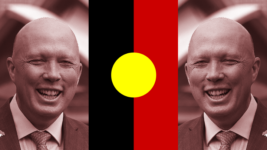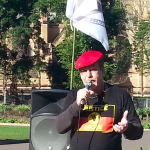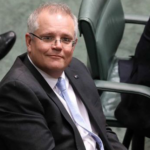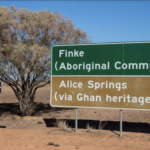Peter Dutton’s Paternalistic Election Promises Hint at a Potential NT Intervention 2.0

With a federal election looming, opposition leader Peter Dutton broke early from the starting blocks this month to deliver an assortment of racist dog whistling statements that began with his repeating his concerns in regard to Indigenous flags and ended with election promises that sound disturbingly like some of the precursors and practices of the 2017-launched Northern Territory Intervention.
Dutton told SKY News on 9 January 2025 that if elected into office, he’ll be ending the 2022 Labor-introduced practice of federal politicians speaking before three flags – the Aboriginal, the Torres Strait Islander and the Australian – because the parliamentarian with a flair for division finds the practice all too divisive.
The only frontbencher to boycott the 2008 Rudd government apology for the Stolen Generations, Dutton then vowed the following day to reverse a 2022 Albanese government directive to allow councils to hold citizenship ceremonies on days other than 26 January. And he then told a reporter on the 14th that he would willingly pass legislation to ensure Australia Day remains on 26 January.
But it was at a presser on 12 January 2025 in the Naarm-Melbourne suburb of Waverley that the Liberal leader and potential next PM began spruiking future policy positions regarding Indigenous affairs that don’t involve the 26th of January that alarm bells started ringing in respect of what a Dutton government might have install for Aboriginal peoples, especially in the north of the continent.
Paternalistic pontificating
“We will also not neglect disadvantaged Indigenous Australians,” Dutton told a press conference in Waverley on 12th of this month. “We can press ahead with a Dutton Coalition government’s priority to focus on practical action for Indigenous Australians.”
The former home affairs minister said the Albanese government has run out of steam on Indigenous affairs following the failure of the Voice referendum, so the Liberal Nationals will be stepping in, and based on the understanding of Senator Jacinta Nampijinpa Price, it’s time to “dispense with racial stereotyping which treats all Aboriginal people the same” and help those most in need.
“There are communities where safety, housing, health, education and employment are critical issues,” Dutton outlined, and “that’s where our efforts must be targeted”.
So, the Liberal leader appears to be suggesting that First Nations people living in urban areas don’t require the same government attention as those living in remote Aboriginal communities in the centre and north of the continent.
Dutton went on to tell reporters that the Coalition would “start with a full audit into spending on Indigenous programs” on taking office and it would further “reintroduce the cashless debit card for working-aged welfare recipients” in communities where drugs and alcohol are an issue.
“We will bolster law and order in crime-heavy communities. And we will hold a Royal Commission into sexual abuse in Indigenous communities,” the Liberal leader continued. “If Labor has neglected disadvantaged Indigenous Australians, it has treated regional Australians like second-class citizens.”
Hints of the NT Intervention
Suggesting that Aboriginal communities need special attention coming from the Coalition should be duly noted, as the last time the Liberals Nationals showed such concerns about Northern Territory communities, the Howard government sent the army into remote Aboriginal communities to launch the 2007 NT Intervention, which Labor then continued under the banner of Stronger Futures.
The Liberal Nationals actually sent in uniformed Australian Defence Force troops to secure 73 remote Aboriginal communities on the pretext that there was a paedophile ring epidemic, which was based on ABC media beat-ups that involved the dissemination of disinformation about child sex abuse rings in First Nations communities delivered in a duplicitous manner.
And attempts have been made to apply the child sex abuse pretext to facilitate other agendas. The Western Australian Liberal Nationals government of 2015 launched an official investigation into child sexual abuse in remote Aboriginal communities in that state, when it was experiencing pushback on its decision to close around 150 remote Aboriginal communities in WA.
This is why Dutton raising a Royal Commission into sexual abuse in Indigenous communities is a red flag, as is suggesting a law-and-order rollout, the need to show special paternalistic attention to remote communities, the auditing of Indigenous programs that are already regularly audited and the reimposition of the cashless debit card, which Albanese said he revoked but merely rebranded.
The NT Intervention disrupted remote Aboriginal communities and imposed oppressive control over the daily lives of their populations. The state acquired the Aboriginal-owned land these communities are situated upon for the period of five years. Bans on alcohol and pornography were implemented and out-of-town medical teams were flown in to conduct examinations on children.
Quietly brought to an end in mid-2022, the NT Intervention further saw income management by way of cashless debit cards, parents welfare payments being linked to children’s school attendance, police presence dramatically increased and a successful community development program that allowed participants to work for a wage was abolished in favour of a work-for-the-dole scheme.
The 2007 NT reimposition of policies hearkening back to the Protection Era of the late 1800s and early 1900s was further accompanied by the 2009 A Working Future policy rolled out by a Labor NT ministry working with a Labor federal government, which saw the establishment of what became 16 hub towns, where people from remote communities under siege inevitably moved to.
I love a sunburnt land acquisition
Senator Price has raised issue with the Albanese government, claiming it’s abandoned Mparntwe/Alice Springs to “crime and dysfunction”, and the politician of Warlpiri and Celtic descent has suggested the auditing of Indigenous programs.
The Country Liberals were voted into office in the NT last August, and the Finocchiaro ministry immediately delivered a package of five law-and-order bills targeting youth crime, including lowering the age of criminal responsibility back down from 12 to 10, the imposition of public wanding laws, a presumption against bail for serious offenders, and a crackdown on public drinking.
The NT Finocchiaro government has also flagged granting itself powers to exempt major projects in its jurisdiction from regular environmental assessments.
So, it would appear the stage is set for a Dutton Coalition government to come to office and then implement a policy of overbearing paternalism and community disruption in the Northern Territory, which might just put a smile on the dial of many a mining mogul who may consider US president Donald Trump’s “drill baby drill” disposition to be a winner.







